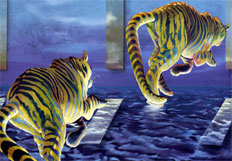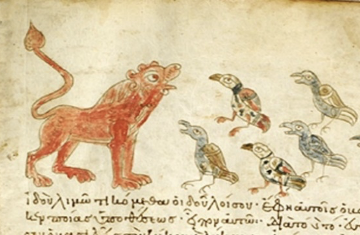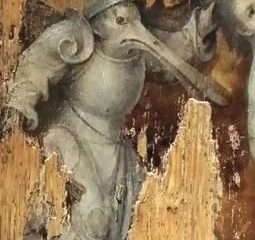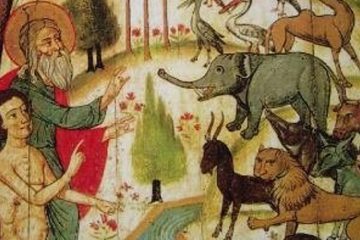
Seminar at the Annual Meeting of the American Comparative Literature
Association
Harvard University, Cambridge, MA, March 17-20, 2016
Organizers: Peter Meedom (Oslo); Frederike Middelhoff (Würzburg)
How should literary animal studies study animals (to paraphrase Cary
Wolfe)? How do animals form texts and, conversely, how do texts form
animals? This year’s ACLA seminar (‘What Is Zoopoetics?’) proved that
animals cannot be separated from the question of language, metaphor, and
form. In other words, animals produce and pose eminently formal
questions with regard to literature. Yet at the same time a fundamental
uncertainty was revealed about the object of literary animal studies:
What counts as an animal and how do we make these beings legible? Should
we only deal with recognizable mammals, fish and birds, or should we
also engage with any other form of life – bacteria, fungi, insects,
plants, or even imaginary beings – when literature presents us with
these? And are we not falling into the trap of a bêtise (Derrida) if we
intuitively categorize and label textual forms of life as ‘animals’,
thus, re-affirming the asininity of the ‘animot’? This second Zoopoetics
seminar wants to take advantage of the conceptual uncertainty and ask
what might be gained on the one hand by conceiving zoopoetics as a study
of how literature creates and develops forms of life, and on the other
hand by probing the specifics of species as well as individual forms of
life – a notion of zoopoetics closely linked to Aaron Moe’s appeal to
formally investigate “another species bodily poiesis” in literature. In
this sense, it might be productive to question the self-evidence of
terms like ‘animals’ or ‘nonhuman animals’ and pay attention to how the
texts themselves actually conceive forms of life. Can we as literary
animal studies scholars approach literary forms of life without being
biased by our zoological knowledge and tendency to explain animals with
the means of discourse analysis? From the very beginning, literary
animal studies has tried to avoid reading animals as simple stand-ins or
content carriers for something else, particularly human psychology.
However, this well-founded impetus is often accompanied by a certain
skepticism towards metaphor and symbolism as such, if not by an outright
lament over the lack of ‘real’ animals in a text. These difficulties
testify to the methodological challenge of doing literary animal studies
– somewhere between an overtly literalized animal and the animal as
symbolic container. It might then be at the level of significant form
that the point of enmeshing of animals and text allows for the reading
of “a logic different from that of intentionality or psychological
interiority” (Susan McHugh). Further, instead of framing zoopoetics
within the human-animal distinction, the cybernetic triangle (Dominic
Pettman) could help to grasp the inseparability of animal, human, and
technology. This seminar seeks papers engaging with zoopoetics both as
an object of study – i.e. literary texts from any tradition or period
which develop and discuss forms of life – and as a methodological
problem for literary animal studies.
Abstracts should be submitted online
(http://www.acla.org/node/add/paper) from Sept. 1 until Sept. 23.


